I concluded the last blog with a quote from Shaw: “Those who can, do – those who can’t, teach.” I don’t believe that. What I do believe is teaching can be one of the highest callings. Teachers are the unsung heroes of America. Granted, in the second part of the first novel of the trilogy, the narrator has a love-hate relationship with teaching, but at the end of that section, he, for the time being, realizes this is where he should be. And at the end of this story (our trip to Europe), I believe this is where I should be. The only difference now is my daughters sometimes think I have more to teach me than I do them.
Yesterday was our last day. At Shakespeare’s Globe Theatre no less. Shakespeare, in terms of the arts, is the most influential writer ever (my opinion), followed by Dante, Homer, Tolstoy, Chaucer, Dickens, Joyce, Milton, Virgil, Goethe, and Cervantes (in that order [my opinion]). But we’ve just returned to my mother’s roots: Scottish, English, Welsh, and Irish. My father’s? Later perhaps. They would include all the rest of the aforementioned: Dante, Homer, Tolstoy, Virgil, Goethe, and Cervantes.
But as far as my mother? We always had a love affair with the English language. She, the town librarian, and I, the professional grad student who thanks to free tuition as a graduate assistant and the GI Bill to boot, actually made money, as long as I continued. However, time became paramount since my goal was to write the Great American Novel. And being a descendant of the English poet Thomas Gray, the bar was already high.
Anyway, getting back to Shakespeare: after all his plays I’ve read and seen, the one thing I learned yesterday was what his audience was really like. I always knew he wrote for the peanut gallery, too, but I didn’t realize the extent to which they were so much a part of the audience. And yet, in spite of all that, he created works that belied the tastes of most of them. And yet they loved it. I’m sure there’s a lesson there for every aspiring writer. A lesson there, I’m sure, wasn’t wasted on the Harold Robbins of the world.
Of course, any comment about Shakespeare at this point would be as presumptuous as making an original comment about the Bible other than to say both were written in King James English but about a generation apart, all the while writing it in the style of Shakespeare’s day rather than King James’ day for the simple reason the translators for the King James Bible wanted the more dramatic language of Shakespeare’s day and as I had mentioned in a previous blog, how one could so effortlessly segue from both Macbeth’s and Hamlet’s soliloques into the last chapter of Ecclesiastes.
But ultimately these blogs are about my daughters and their dreams so in conclusion, although it’ll take awhile for all of us to process all this – at this point it’s up to them. How they do it and in what way, I don’t know. All I can do is give them the opportunity.
E.g.,, Proverbs says, “Bring up a child in the way they should go, and later on they will not depart from it.” Now we all know the obvious interpretation, but since I’ve seen too many who contradict that, I began to suspect it was one of those verses parents either misinterpreted or used to their own advantage. Too often, the way “they should go” becomes a license for self-serving parental control when all along it meant what’s best for the child. How many kids are forced to accomplish what the parents couldn’t?
In the movie The Sandpiper, Elizabeth Taylor, a free-spirited Bohemian is forced by the state to send her son to school. She asks Richard Burton, the headmaster of an elite Episcopal prep school why she should send her son to his school. His answer: “Because we will give him a set of values he can rebel against later on in life lest he rebel against yours.” Hopefully, I won’t make that mistake.
P.S.: But about Shakespeare? My opinion? Out of the top 10 greatest plays ever written? Five are Shakespeare’s: Lear, Hamlet, Macbeth, Othello, and Twelfth Night (in that order [my opinion]).
To be continued later when I process all this –

